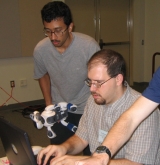Generalized Model Learning for Reinforcement Learning on a Humanoid Robot
Generalized Model Learning for Reinforcement Learning on a Humanoid Robot.
Todd
Hester, Michael Quinlan, and Peter
Stone.
In IEEE International Conference on Robotics and Automation (ICRA), May 2010.
Video available at
http://www.cs.utexas.edu/~AustinVilla/?p=research/rl_kick
Download
Abstract
Reinforcement learning (RL) algorithms have long been promising methods for enabling an autonomous robot to improve its behavior on sequential decision-making tasks. The obvious enticement is that the robot should be able to improve its own behavior without the need for detailed step-by-step programming. However, for RL to reach its full potential, the algorithms must be sample efficient: they must learn competent behavior from very few real-world trials. From this perspective, model-based methods, which use experiential data more efficiently than model-free approaches, are appealing. But they often require exhaustive exploration to learn an accurate model of the domain. In this paper, we present an algorithm, Reinforcement Learning with Decision Trees (RL-DT), that uses decision trees to learn the model by generalizing the relative effect of actions across states. The agent explores the environment until it believes it has a reasonable policy. The combination of the learning approach with the targeted exploration policy enables fast learning of the model. We compare RL-DT against standard model-free and model-based learning methods, and demonstrate its effectiveness on an Aldebaran Nao humanoid robot scoring goals in a penalty kick scenario.
BibTeX Entry
@InProceedings{ICRA10-hester,
author="Todd Hester and Michael Quinlan and Peter Stone",
title="Generalized Model Learning for Reinforcement Learning on a Humanoid Robot",
booktitle = "{IEEE} International Conference on Robotics and Automation (ICRA)",
location = "Anchorage, Alaska",
month = "May",
year = "2010",
abstract = "Reinforcement learning (RL) algorithms have long been
promising methods for enabling an autonomous robot to improve its
behavior on sequential decision-making tasks. The obvious enticement is
that the robot should be able to improve its own behavior without the
need for detailed step-by-step programming. However, for RL to reach its
full potential, the algorithms must be sample efficient: they must learn
competent behavior from very few real-world trials. From this
perspective, model-based methods, which use experiential data more
efficiently than model-free approaches, are appealing. But they often
require exhaustive exploration to learn an accurate model of the domain.
In this paper, we present an algorithm, Reinforcement Learning with
Decision Trees (RL-DT), that uses decision trees to learn the model by
generalizing the relative effect of actions across states. The agent
explores the environment until it believes it has a reasonable policy.
The combination of the learning approach with the targeted exploration
policy enables fast learning of the model. We compare RL-DT against
standard model-free and model-based learning methods, and demonstrate
its effectiveness on an Aldebaran Nao humanoid robot scoring goals in a
penalty kick scenario.",
}



